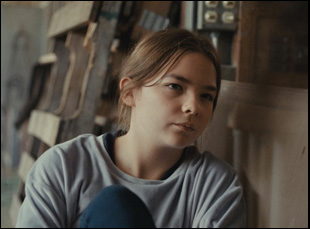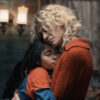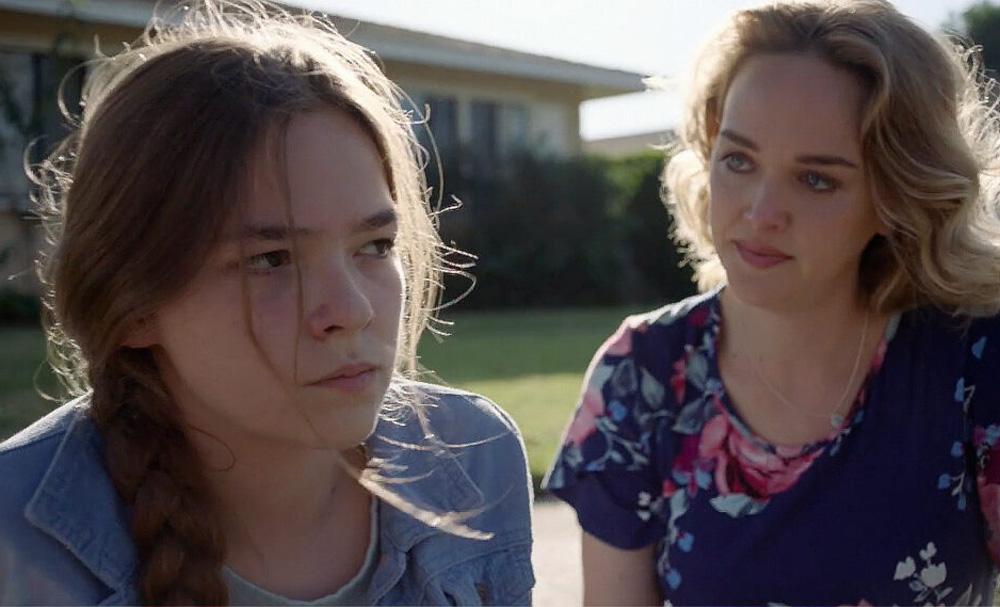It isn’t the worst idea that Arlene (Jess Weixler) has in “Wayward,” unable to get through to her daughter Cleo (Chloe Guidry) who is upset that they’ve had to move again after she’s found a new boyfriend (Rob Morrow) and refusing to speak to her as they make their way from Sacramento to Los Angeles. Seeing a busker named Orbison (Jessica Sula) with a sign asking for a ride to San Francisco outside a gas station, Arlene thinks she can do the singer as much of a favor for herself as this stranger if she can connect with her 11-year-old and make the car ride a little more tolerable, getting far more than she bargained for when the two start singing together.
However, that shouldn’t be mistaken for harmony in Jacquelyn Frohlich’s devious debut feature in which all three take each other for a ride in different ways, having different ideas of where they should be in their lives. Although it’s Arlene at the wheel initially, the film takes a dramatic turn when Orbison reveals she’s not the innocent she appears, eventually contacting her boyfriend Frank (Will Brittain) who is a lot closer to her than San Francisco and holding Cleo for ransom, but while Arlene freaks out, her daughter is far more comfortable in the hands of her captor when it gives her a chance to see how much she’s actually worth to her mother.
The cops don’t need to get involved to expose the compromising position that each of the characters in “Wayward” find themselves in when Frohlich pulls that off so effectively, using the kidnapping to reveal what they all really want as Orbison may want to prove her devotion to her partner and at the same time get up from under his thumb, Arlene is pressed to confront the choices she has made that have made Cleo feel like a second fiddle and Cleo finds some unusual leverage to make her voice matter. That last part could also describe Frohlich, who cuts through the noise with a first feature that surprises with its criminal element and perhaps even more so the fallout when it causes reflection on how everyone has been treated that led them to where they stand now. Put through a trial by fire herself on a production that as she describes wasn’t the easiest, the writer/director ends up like her heroines appearing stronger for having had the experience.
After premiering last year at the Deauville Film Festival, “Wayward” has started its U.S. theatrical run and Frohlich graciously took the time to talk about turning her attention from writing novels to pursuing filmmaking, managing to make the most of a budget where little could be allocated towards what went on screen and how her cast rose to the occasion, playing a fractured family in the film that coalesced well behind the scenes.
 If you don’t mind my going back a little bit, I’ve heard that you actually started out writing novels. How did film become an artistic pursuit?
If you don’t mind my going back a little bit, I’ve heard that you actually started out writing novels. How did film become an artistic pursuit?
I went to Sarah Lawrence for MFA in fiction writing. That was my dream, to be a novelist. I felt if I got published and reviewed in the New York Times, I would just die a happy person. And I tried really, really hard. I wrote three novels, but with novels, you can’t really self-publish at least not when I was trying. It would make it less respectable. And I wanted to be a real “novelist.” So I moved from New York to L.A., and a friend of mine wanted me to write a script. She was a producer, one of her short films had got nominated for an Oscar, and she wanted to start creating her own content, so we worked on a script together, but very quickly I realized if I’m going to be writing scripts, what I most value about writing is the fact that I get to have my own voice and I realized the minute that I give my script away, it’s no longer mine. They could bend it any way they want and I thought, that’s not really something I want to do. So at the same time, I was getting divorced, and I thought “I want to go radical and go to film school.” My friend said, ”There’s no way you can go to film school. You have three little kids, but I will help you produce a short film for free.” And that’s how I started.
Then I did a few short films and I decided I need to take the leap and make a feature. I wanted to do it as independently as possible because I knew if I start taking tons of money in, [I wouldn’t have as much control.] There were offers to come in with big money and help me produce the film, but I really wanted to keep it as small as possible. I initially wanted to write a road movie because I thought it would be cheaper, but because we have so many locations, that’s where your money goes. But I raised almost all the money myself, and then I found Ian [Michaels, my producer] by accident because one of the actors in one of my short films, had known him and I wanted some advice about how much money I could really afford to spend on a casting director. He was so incredible, I loved him right away and I said, “Oh my God, would you consider coming in as a producer?” He read the script and then it all pretty much happened serendipitously. But I’d been working really hard, writing novels and knocking on every door and nothing ever happened for me, so the way that “Wayward” developed with every single door opening quickly, I just knew it felt right for me.
It was interesting Colleen Camp in the mix as an executive producer as well as an actress because she’s quite supportive of filmmakers early in their careers. How did she come onboard?
She’s such a champion of young filmmakers and I don’t think she gets enough credit for the job she does because she’s not just incredible in terms of connecting you with people, but also how she gives you feedback. She came on initially as an actress for a very, very small role, but we immediately connected. Everyone who knows Colleen will probably say the same thing because she has this incredible charm and you immediately feel like she’s your best friend. But she was just so supportive on set. Even though this was my first film, she would say, “Everything you’re doing is incredible. I want to be involved with you.” And when we showed her the film when it was done, she gave me incredible notes as we were editing and wanted to be involved [as an executive producer]. I’m forever grateful. It’s a different film because of her notes.
Is it true that it’s a pretty different film from even what it was early in the script stage? I understand may have started out from the mother’s point of view and obviously that flipped.
Yes, initially, I wrote the story from the mother’s point of view and no one was really responding when I went around with it and I was trying to figure out why. I finally gave up and worked on another script, but this story kept tugging at me, so I thought, “What if I just make it from the kid’s point of view? And it started to really be something of interest for me because I thought, not only can I do it from the kid’s point of view, but then it’s a story that’s very rarely told from a child’s point of view, and [you could do it] in a way that’s beautifully photographed from [that perspective], which is rarely done or not done enough. Different characters took on different roles because I did it from the girls’ point of view – Orbison initially was not really an engine [for the story as she is now]. It was more about Frank and what she would do to help him because she loved him. Once I recognized that all the women are the real driving force, the whole story just took on more power. Thematically, what joins them is this sense of longing – each of them have this deep longing to belong in the world and to matter. Cleo is the most obvious in terms of that desire to want to matter to her mother, to want to belong to a real family. but then all the other characters have the same want in a way, just expressed differently.
How did you end up finding Chloe to play Cleo?
She’s extraordinary. We found Chloe initially through tape because it was during COVID, and we weren’t really meeting anyone. I loved her, but she lived in New Orleans and our budget really didn’t allow for any actor that didn’t live in Los Angeles, but somehow we were able to work it out because we loved her. We did a few auditions with a couple of actors [playing the adult roles] and one scene where Orbison and Cleo are in the room together, which I call the confession scene, Cleo has to give Orbison the finger and there was a way in which Chloe did it that just was coming from something so deep that felt it was more than bitterness. When you get to that layer, it’s more than sadness and it’s more than anger and I just [thought], “Okay, this girl’s incredible” because you can’t teach that. We were so lucky to have her as a star.
When you get it in the hands of the actors or start seeing the dynamics between them, is there anything that where it takes off in ways that you might not have expected or you could get excited about and embrace?
For whatever reason, I think both Chloe and Jess Weixler unconsciously became the mother and the daughter, so they were awkward with each other [in that parent-child way]. Then when Jessica Sula came on, she’s so cool and she has a part of her that’s just very childlike – not childish, but just amazing for children to be around, so those two just immediately bonded and that was the luckiest thing in the world because that’s exactly the dynamic that needs to start playing out in the film. It almost feels like the things that are on the page start playing out even before you get there on set, or at least that was my experience with this film.
You mentioned how costly locations could be, but knowing that this was shot in Los Angeles, I was impressed that I recognized so few of the locations, so you really got something new from them. How did you figure it out?
I have to give props to my producer Ian Michaels, because we had a very small budget, and a third of it went for COVID testing, so we really had very limited money. Ian comes from working with the Duplass brothers, so he knew how they work is you use your house and other people’s houses and that’s what we did essentially. Then all the driving scenes were heroic – I wanted it to feel very real and I felt that if it did not feel like this isn’t really happening, we would not buy any of it. But we only had a process trailer to go with the car for 18 hours, and the rest was Jess Weixler driving and we had our DP in the trunk with the sound guy and she had to negotiate all those elements, including other cars in the road. I didn’t know how it was going to turn out and that was really hard and props again to Jess Wexler because she had to worry about not crashing and play her part, but I’m really thrilled that that came out great.
It’s funny because you have to get incredibly close to her in that kind of space, but it doesn’t feel at odds with the camerawork in the rest of the film. What it was like to figure out a cohesive visual language for this?
I think visual language is actually one of the most important elements in a film and outside of casting, one of the most important decisions. I felt really that this story had to be shot always from behind and never ahead of the action so that we could feel like we were in that journey with every one of the characters. And I found Ben [Hardwicke], who is an incredible cinematographer, but it was challenging [to find the language]. One of the benefits of having handheld camera is that we could hide the fact that we didn’t really have a lot of money for production value. We just could not show wide shots because we couldn’t fill them up and make them beautiful, but I also wanted that claustrophobic feeling that you have at the beginning and as the story progresses, the frame starts opening a little bit.
That seems fitting for how it seems to open horizons more generally. When it’s your first feature and you have this huge achievement under your belt, what’s it like to have as something to build on?
I don’t want to sound like that Southern California girl, but there’s almost like a spiritual element to it because you just can’t believe that this will happen. Shooting a feature film is probably the hardest thing I’ve ever done in my life, and I’ve had children. You have to negotiate all these elements, not just the actors, but everyone is coming in with their own [ideas] and you have to learn how to move that around for the benefit of the story in the film. It’s really hard and to see how it all came together and seeing it done, it’s really a profound experience.
“Wayward” opens on November 22nd in New York at the Village East.




